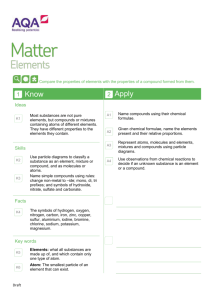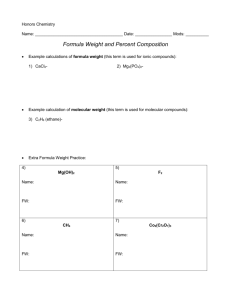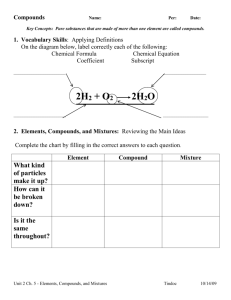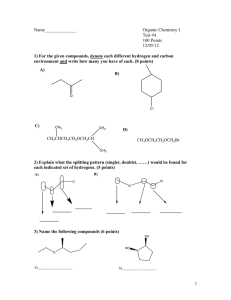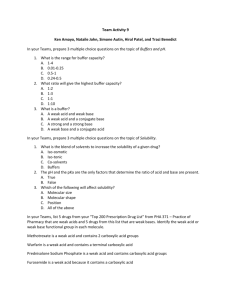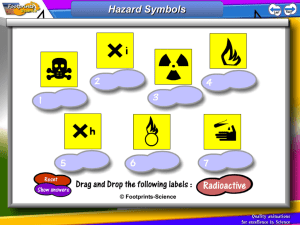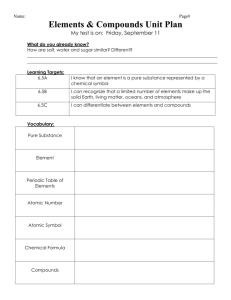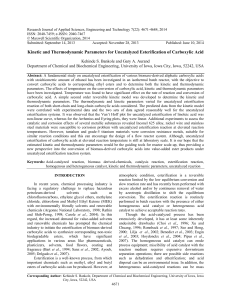WORD doc.
advertisement
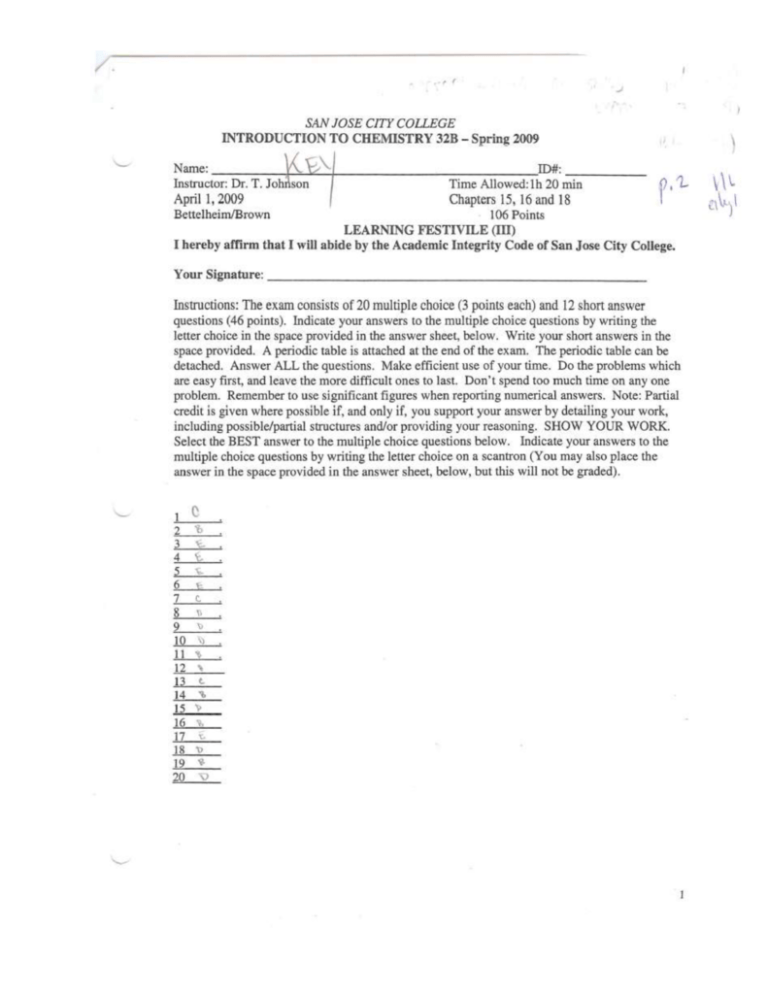
1 MULTIPLE CHOICE QUESTIONS (40 POINTS) 1. Which compound is a secondary amine? A. trimethylamine B. isopropylamine C. diethylamine D. N,N-dimethylethylamine E. N-ethyl-N-methylpropylamine 2. Which of the following compounds do not contain a stereocenter? A. 2-chloropentane B. 3-chloropentane C. 3-chloro-1-butene D. A and B E. none of the above 3. Which of the following compounds do not contain stereocenter? A. 1-phenyl-1-propanol B. 2-methylcyclopentanol C. 1-chloro-2-propanol D. A and B E. none of the above 4. All of the following are properties of amines except: A. those that can form hydrogen bonds have higher boiling points than expected for their molecular weight B. those with low molecular weights are water soluble C. they frequently have offensive odors D. they act as bases in many reactions. E. they react with acid halides to form amides 5. Arrange the four compounds in order of increasing boiling point: (i.e. lowest to highest) (1) CH3CH2CH2CH3, (2) CH3CH2CH2OH, (3) CH3CH2CH2NH2, (4) NH2CH2CH2OH A. 2,1,3,4 B. 1,3,4,2 C. 1,2,3,4 D. 1,4,3,2 E. 1,3,2,4 6. If methylamine reacts with hydrochloric acid, the major product will be A. ammonium chloride B. dimethylammonium chloride C. trimethylammonium chloride D. methylammonium hydroxide E. methylammonium chloride 2 7. All of the statements about carboxylic acids are true except A. they undergo substitution reactions involving the –OH group. B. at low molecular weights they are liquids with sharp stinging odors. C. when they behave as acids, the –COOH group gains H+ and thus, is protonated. D. they form hydrogen bonds, causing their boiling points to be higher than expected on the basis of molecular weight. E. they react with bases to form salts which are often more soluble than the original acid. 8. Consider these four compounds: (1) CH3OH, (2) CH3SH, (3) (CH3)2NH, (4) C6H5NH2 Which is the strongest base? A. compound 1 B. compound 2 C. compounds 1 and 2 are equally the strongest bases D. compound 3 E. compound 4 9. When two carboxylic acids combine, water and which of the following compounds is formed? A. alcohol B. ester C. amide D. anhydride E. ketone 10. Compounds that are classified as diastereomers can as exist as: A. Molecules having no stereocenters B. Molecules that have the same carbon skeleton, are non super imposable and are non mirror images of each other with the same M.F. C. Molecules that have the same carbon skeleton, are non super imposable and are mirror images of each other with the same M.F. D. A and B E. A and C 11. Fisher esterification can involve the reaction of ethanoic acid with ethanol in the presence of H2SO4 to produce? A. methyl esters B. ethyl ethanoate C. ethyl amide D. ethanamine E. acetic acid 12. When hexanedioic acid reacts with a 1,6 -hexane-di-amine at high temperature (250*C) and pressure (15 ATM) the major product is: A. a polyester, aka- (Dacon) B. a polyamide, aka- (Nylon) C. a polycarbamate, aka- (Lexan) D. a polyamide, aka- (Kevlar) E. none of the above 3 13. An acid anhydride is formed by A. Repeated loss of water molecules from carboxylic acid leaving many carbon-carbon double bonds. B. Addition of water to two carboxylic acid molecules. C. Removal of water from two carboxylic acid molecules D. Repeated reaction of acid with water forming polymers. E. Removal of water from one carboxylic acid molecule, leaving behind a carbonyl group and an alkene. 14. Arrange these compounds in order of increasing acidity: (i.e. weak = 1, strong = 3) benzoic acid (1), benzyl alcohol (2) and phenol (3). A. 1,2,3 B. 2,3,1 C. 3,2,1 D. 1,3,2 E. 3,1,2 15. Reaction of an ester with a strong base is called A. hydrolysis B. Fisher Esterification C. saponification D. both A and C E. trans (or reverse) esterification 16. What is the compound in willow tree bark that is responsible for its ability to relieve pain? A. acetominophen B. salicin (salicylic acid) C. phenacetin D. acetanalide E. none of the above 17. The Elutant in Thin Layer Chromotography (TLC) is part of the . . A. stationary phase B. mobile phase C. solvent front D. both A and C E. both B and C 18. Menthol is the main component in peppermint oil and has the 1R, 2S, 5R stereochemistry. Identify which structure below (2-6) has the 1R, 2S, 5R stereochemistry. A. 2 B. 3 C. 4 D. 5 E. 6 4 19. Which molecule is chiral? A. CH3OH B. CH3CHBrOH C. CH3Cl D. CH2ClBr E. CH2FCl 20. The penicillin's are an important class of broad spectrum antibiotics. How many stereoisomers exist for penicillin V (1)? A. 2 B. 4 C. 6 D. 8 E. 16 1 Short Answer Problems: 5 6 7 8
